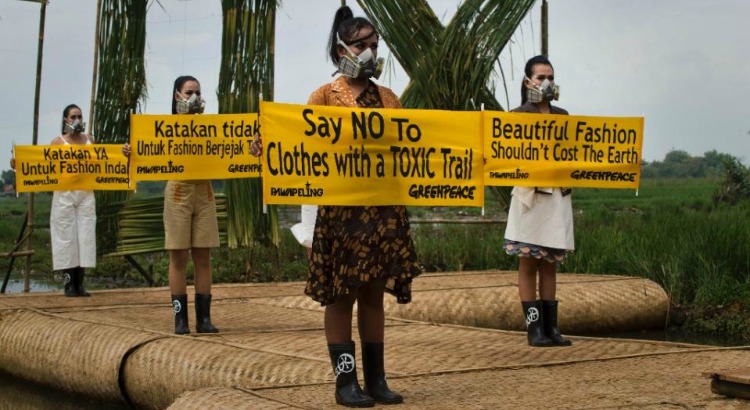Toxic Trail: Indonesian models in gas masks address environmental ravages
mis à jour le 14 July 2015 à 18:31Due to the drive to increase profits, many clothing companies are using manufacturing processes that are full of toxic chemicals and are unleashed into our rivers, damaging our environment and health.
Thankfully, environmental organisations, such as Greenpeace, are trying to bring change to the toxic fashion industry by raising awareness and striving towards a toxic-free world of clean production.
As part of the Detox campaign, launched in 2011 to expose the direct links between global clothing brands, their suppliers and toxic water pollution around the world, the Greenpeace group’s campaigner Ahmad Ashov Birry condemned the role of the Indonesian fashion industry. He lambasted them as main actors in creating environmental havoc from their textile factories by supplying fabric materials to local and famous international fashion brands. In fact, their production is only releasing hazardous industrial waste into their country’s water.
Thus, to urge them to remove those toxic chemicals from their supply chains and address water pollution, Greenpeace organised a catwalk in central Indonesia, in one of the most polluted river basin, planted mostly with rice, in Rancaekek. Here, Indonesian models paraded down wooden planks wearing dresses of designers such as Felicia Budi, Lenny Agustin and Hanna Farhana, with black rubber boots and gas masks while holding signs that read, “Say no to fashion with a toxic trail.”
Rancaekek is at the heart of the Indonesian textile industry and was named one of the 10 most polluted places on Earth in 2013 by environmental groups like the Blacksmith Institute and Green Cross Switzerland. Consequently, according to Greenpeace, more than 100 million Indonesians, out of a population of 250 million, have no access to safe water.
Hence this show aspired to raise awareness among global players and international brands of their actions. The power is in their hands because they could eliminate the negative environmental impact of their production by choosing suppliers who do not unleash toxic chemicals into the environment.
So far, the campaign has been able to secure public commitments from 20 international fashion companies: Nike, Adidas, Puma, H&M, M&S, C&A, Li-Ning, Zara, Mango, Esprit, Levi's, Uniqlo, Benetton, Victoria's Secret, G-Star Raw, Valentino, Coop, Canepa, Burberry, and Primark.
This is a clever initiative to incite fashion companies to respect our environment and value our health! Clothing makes people feel good and beautiful, and it starts from the way they are manufactured! Doesn’t it?
Lindsay POUI-DI




